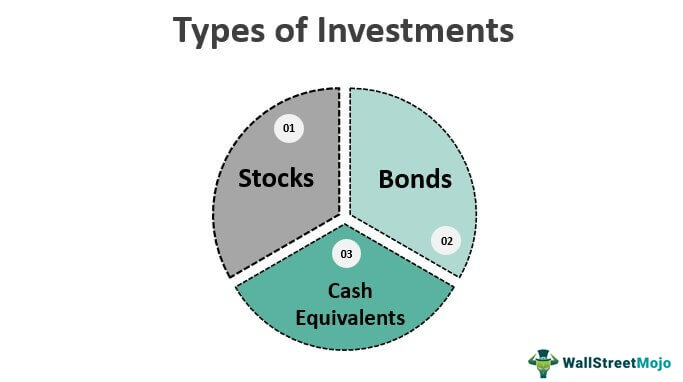Investing is vital in financial planning, providing opportunities for growth and income. Knowing the different investment products is key to creating a diversified portfolio. This article explores some of the most popular investment options, including stocks, bonds, and more, offering insights into their features and potential advantages.
Stocks: Equity Investments
Stocks, or equities, are one of the most famous Types of investment products (投資商品種類). They symbolize ownership in a company. Buying a stock means acquiring a portion of the company’s assets and earnings potential. These investments are actively traded on exchanges, offering opportunities for profit through increased value and periodic dividend payments, making them a cornerstone of many investment portfolios.
- Capital Appreciation: The value of your stock increases as the company grows and becomes more profitable.
- Dividends: Periodic payments made by the company to shareholders from its profits.
Investing in stocks involves higher risk compared to some other investment products, but it also offers the potential for substantial returns. It requires careful analysis of the company’s financial health, market conditions, and economic factors.
Bonds: Fixed-Income Securities
Bonds are like IOUs issued by companies, cities, or governments to raise money. Upon buying one of these, you lend money to the issuer. They promise to pay you interest regularly and return the borrowed amount when the bond matures.
Corporate bonds come from companies needing money to run their business or expand. Municipal bonds come from local governments and often give tax breaks because they pay interest not taxed. Treasury bonds from the government are very safe because the country itself backs them.
Compared to stocks, bonds are less risky and give a steady income. But if interest rates rise, bond prices can drop, affecting how much money you make. Bonds are important in balancing risks and income when you invest.
Mutual Funds: Diversified Portfolios
Mutual funds pool money from many investors. With this, they buy a mix of stocks, bonds, or other assets. Professional managers run these funds, so you don’t have to pick investments. This setup spreads risk across different assets and aims to strategically boost returns by managing the portfolio.
- Equity Mutual Funds: Primarily invest in stocks.
- Bond Mutual Funds: Focus on fixed-income securities.
- Balanced Funds: Invest in stocks and bonds to balance risk and return.
They are suitable for investors seeking diversification and professional management. They come with management fees and expense ratios that can impact overall returns.
Exchange-Traded Funds (ETFs): Flexible and Tradeable
ETFs are traded on stock exchanges, functioning similarly to individual stocks. They hold a diversified portfolio of assets such as stocks, bonds, or commodities.
- Equity ETFs: Track specific stock indexes like the S&P 500.
- Bond ETFs: Focus on fixed-income securities.
- Commodity ETFs: Invest in physical goods like gold or oil.
These allow diversification and easy trading. You can trade them whenever you want during market hours at current market prices. They have lower fees as opposed to mutual funds, which can help maximize your returns. However, keep in mind there may be costs involved with buying and selling ETF shares, so it’s essential to factor these into your investment strategy.
Real Estate Investments: Property and REITs
Real estate investments involve purchasing physical properties or investing in Real Estate Investment Trusts (REITs). These can provide income through rental payments and capital appreciation from property value increases.
- Direct Real Estate Investment: Buying residential, commercial, or industrial properties.
- REITs: Companies that own, operate, or finance income-producing real estate.
Real estate is a hedge against inflation and provides diversification to an investment portfolio. However, it requires significant capital and involves property management responsibilities or trust in REIT management.
Commodities: Investing in Physical Goods
Commodity investments involve purchasing physical goods like gold, silver, oil, or agricultural products. Commodities can be bought directly or through financial instruments like futures contracts, ETFs, or mutual funds.
- Precious Metals: Gold, silver, platinum.
- Energy Commodities: Oil, natural gas.
- Agricultural Commodities: Wheat, corn, coffee.
Commodities are often used as a hedge against inflation and currency fluctuations. Their prices can be highly volatile, since they are affected by geopolitical events, supply and demand dynamics, and economic indicators.
Choosing the right online trading platform
Here are some tips to guide you in making an informed decision:
- Assess Your Investment Needs: Determine what types of investment products you are interested in—stocks, bonds, ETFs, mutual funds, etc. Ensure the platform offers access to these products.
- Check Fees and Commissions: Compare the costs associated with trading. This includes commissions per trade, transaction fees, and any account maintenance charges.
- User Interface and Experience: Evaluate the platform’s interface. It should be intuitive, responsive, and easy to navigate. A well-designed platform can streamline your trading process and reduce the learning curve.
- Research and Analysis Tools: Look for platforms that offer robust research and analysis tools. These may include real-time market data, news feeds, financial reports, and advanced charting capabilities. These tools are essential for making informed investment decisions.
- Security and Regulation: Ensure the platform is regulated by a reputable financial authority. This helps protect your investments and ensures the platform adheres to industry standards. Look for platforms with encryption and other security measures to safeguard your personal information.
By carefully weighing these factors, knowing thoroughly about the various Types of investment products (投資商品種類), and matching them with your financial goals, you can choose an online trading platform that complements your investment strategy. Making informed choices and investing prudently are key steps toward accumulating wealth and attaining lasting financial security.

Leave a Reply